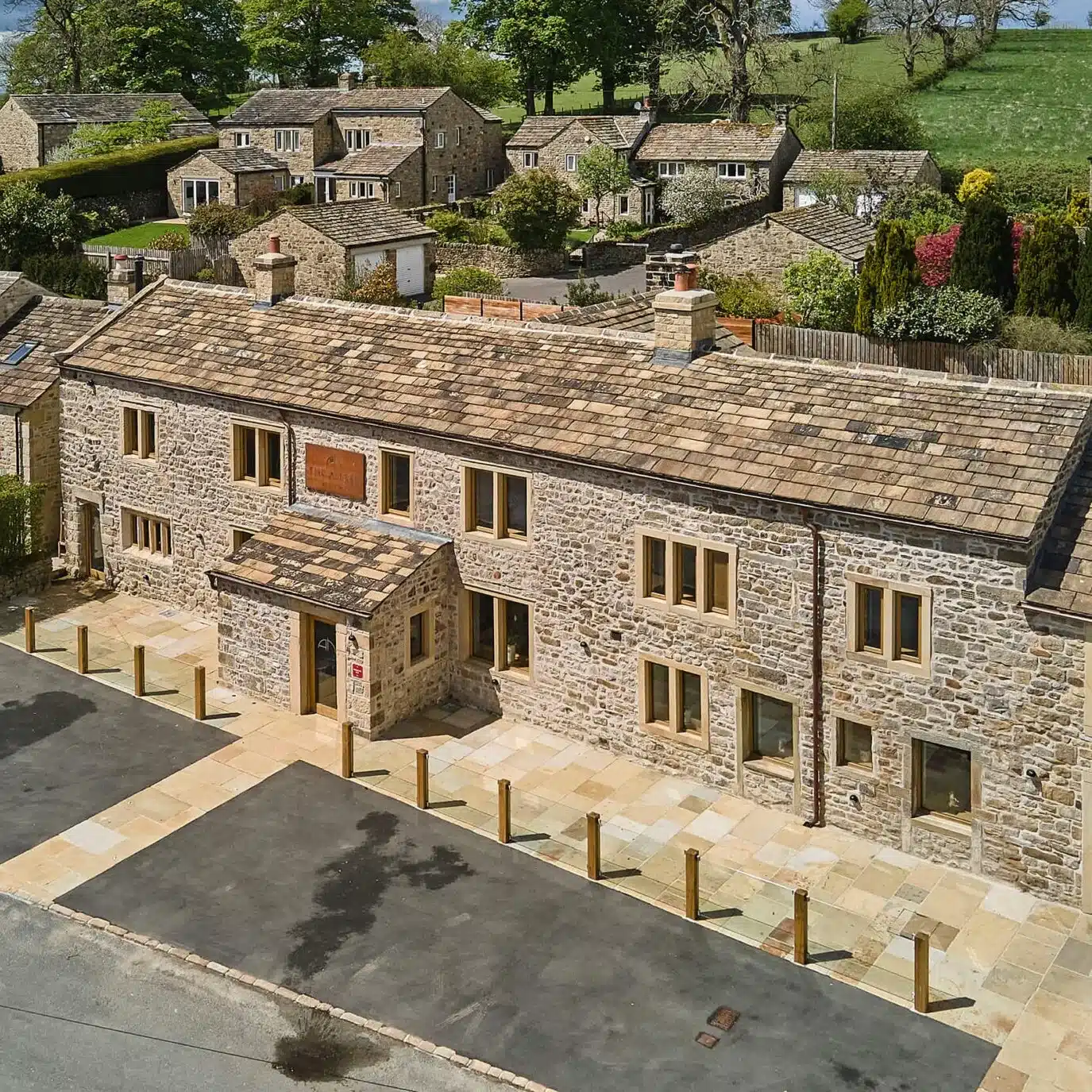Wherever Michael Wignall goes, Michelin stars follow – and The Angel at Hetton is no exception. He tells Absolutely Yorkshire about his passion project
Were you exposed to good cooking and food at an early age?
Yes, my mother was a really good cook and a pâtissier by trade so she always cooked from scratch at home. We travelled quite extensively, so from an early age I was lucky to try different food from all around the world. My dad would force us to try things too!
When did it become a career choice?
A bit by accident. I left school and just wanted to ride my bike, which wasn’t really a feasible career, so I fell into catering college really. But I found that I really enjoyed it and it all stemmed from there.

How important was your stint in Spain after catering college?
Really important, I loved the country already, but it grounded me and matured me. Before then I didn’t really know, despite finishing college, whether I wanted to work in a kitchen or front of house, or even have a career in hospitality. But there I got to work with really nice produce so learning to appreciate that gave me a different outlook.
What important things did you learn in the early stages of your career?
To believe in yourself and that it’s hard work! As with anything, if you want to be good at something it takes a lot of commitment and dedication. Putting the time in to read and dine out and try different food all the time. I’m so glad I realised all that from an early age and stuck to it.
How do you look back on your first Michelin star at Old Beams?
Before then I never really thought that I would get a Michelin star in my own right. I’m my own biggest critic, I always thought I wasn’t good enough! I never set out with that goal in mind so when I did get a Michelin star it really put things into perspective for me that I could go down that fine dining path and to pursue that. The only problem is, when you get one star, you want more!
Wherever you have gone since, Michelin stars have followed. What does that recognition mean to you?
It means everything. You’re only as good as the team that’s with you and it’s just a testament to everyone I have worked with that we’ve achieved it wherever I’ve been. But it’s never a given, it’s hard work to achieve one and hard work to retain it. It’s good to have a goal, it’s good for the business and for me it remains important.

Why, in 2018, did you decide to run your own project with Johanna at The Angel at Hetton?
I always said, throughout my career, that I never wanted a place of my own. I’ve always been present in the kitchen and didn’t want the headache of finances and business management on top of that. But probably about seven years ago, while I was at Gidleigh Park, I had a change of heart and started to feel like I didn’t really want to work for anyone else anymore. It felt like it was time to do something on our own, and our business partners Jo and James Wellock, who are really good friends of ours, were in a position to invest and it’s worked great. With Johanna’s background too, it works, I’m in the kitchen and she runs the finances, HR and all the nitty gritty business stuff, which I definitely couldn’t do as well as her.
What was it about the gastropub that inspired you to take it on?
The location. I didn’t have a huge pull to go back up North, but when we visited the area again I was reminded of how lovely it is. I worked nearby at The Devonshire Arms a long time ago so I knew the Angel, and actually dined here with an old employer Reg Gifford (St Michael’s Nook, Grasmere), he brought me here for Sunday lunch over 20 years ago now so I had fond memories of it. We just saw the potential: it’s a big property and it’s a lovely village. With the rooms as well, we saw the potential to create a destination restaurant in a really rural location. It ticked all the boxes.
What has the renovation project involved?
With the pandemic, what we set out to do has evolved quite a lot. Initially, in September 2018 we ran the pub as it was, then closed in January 2019 for the first renovations, reshaping the bar area and end of the building – which is 15th century, so a big job, an extensive project. We reopened for around four weeks before lockdown, and then within a few weeks of being closed we took a gamble and decided to proceed on with the renovations, which would take around four months, without knowing when we would be allowed to open again under the lockdown restrictions. So we converted the rest of the restaurant building, doing the rooms upstairs.
Then we completely knocked the kitchen down and rebuilt it. It’s all electric and induction, it’s probably the most eco-friendly kitchen in the UK. We had a problem with electricity input in the village, so we have a system that effectively distributes power that is usually used on super yachts. So we have a 300kw kitchen using 42kw, so with the increase in utility charges that has been a really worthwhile project.
Now we’re onto the fourth phase of the renovations, redoing the five rooms over the road in Fell View Barn and adding five more, so that’s an extensive project too. So we started with nine rooms, extended it to 15 and now we will have 20. Then the last phase is to refurbish the rooms in Sycamore Bank House, the cottage adjacent to the main building that will be completed next year, which will be our fifth year here.
What did you want to offer on the menus?
We have a lunch tasting menu, which is slightly shorter, and our dinner tasting menu. We have an a la carte menu too, which is important to me. Because of where we are, and with our rooms, we have people staying with us for several nights so it’s important for us to be able to offer that flexibility between tasting menus and a la carte. We change dishes quite frequently and work with fantastic British suppliers that I’ve worked with for many years, on a local level as well as across the wider country. My food has been inspired by the area here and of course, with it now being our own place, I do have the freedom to be more creative.

Would you say there is a Michael Wignall cooking style now?
I think there always has been. Everyone has always said they can recognise my food. I was a head chef from a young age, I was 26 when I got my first Michelin star, which helped me shape my own style. My style is quite complex and dishes tend to have quite a lot of ingredients on the plate, but I think it’s about making everything work together. Making it pretty is important but fundamentally, the tastes and textures should complement each other and everything is on the plate for a reason.
You were awarded a Michelin star a year after opening. Given this is your own project, was this a bigger deal for you?
It was, because of how challenging it was when we first took over. At first we had many times where we questioned our decision, we took it over and we were running it as a pub, trying to please everyone. It wasn’t really my style of food at first and we were establishing our team, the kitchen was old and it was hard work! To get the star when we did was a huge confidence boost and spurred us on to make it what we have. We’re still not exactly where we want to be, still striving to get better and better.
What dishes or ingredients are you particularly excited about this summer?
We are working on a project with a lamb supplier in Devon. She’s an ex-vet and now breeds lambs. When I first met her we talked about how nobody breeds Pyrenees-style lamb in the UK, so that’s what she’s set out to do. She’s come up with a lamb called Petty Lay, the lambs are milk fed, all organic, and she looks after them like her own from start to finish. The lamb is just amazing, this is the fourth year working with her and the meat just gets better every year.
We’re just coming to the end of our local asparagus season with Spilmans, which has been excellent. And generally in summer I love it when the British fruit season starts, the sun comes out, it’s just a lovely time to start cooking with all the fantastic produce we have available to us.

What can you tell us about the new bedrooms?
They should be ready by the end of August. Five refurbished and five additional rooms. All with high end finishes, handmade furnishings, air conditioning, Harrison Spinks mattresses and excellent amenities with Nespresso machines, Dyson hairdryers and more. When these are complete we will have accommodation for a full restaurant (20 rooms for 40 covers), which is fantastic.







